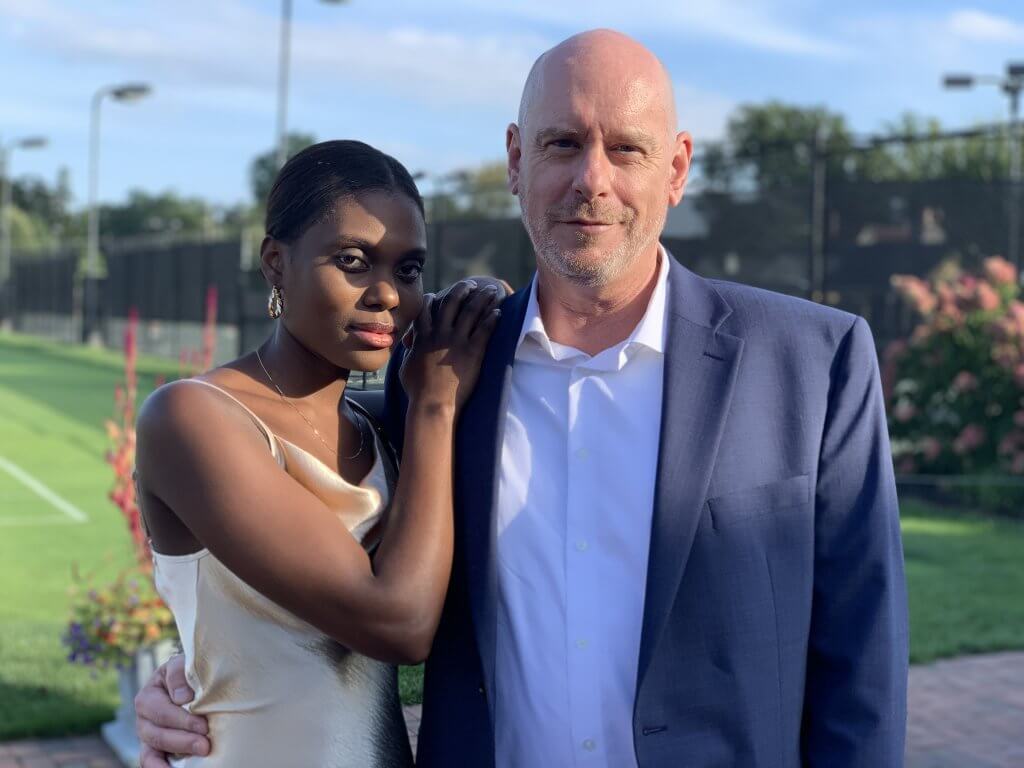Every school day, when Mike James walks into work at Boston Adult Technical Academy (BATA), he sees an inspiring sign painted by the students: Together, We Can.
That philosophy lifted James up after he was diagnosed with early-stage non-small cell lung cancer in August 2019. James leaned on his support network of coworkers, his family, and his care team at Dana-Farber, who together saw him through his participation in a groundbreaking clinical trial.
The trial provided James with a clean bill of health and led to a new U.S. Food and Drug Administration (FDA)-approved treatment option for other patients like him.

Emotional roller coaster
James had been on an emotional high the summer of 2019. He’d just taken a three-week trip to Columbia with his wife, Andrea Mancilla, to visit family members and enjoy a few days on the beach. When they returned home to Dorchester, he attended the wedding of his best friend from BATA.
The day after his friend’s wedding, James went to Brigham and Women’s Hospital. For several months, he’d been experiencing a strange lightheadedness. His new primary care physician had ordered both a stress test and a chest X-ray, since James smoked cigarettes in the past.
James passed the stress test with flying colors, but the X-ray showed a spot of concern. A CAT scan showed he had a lung tumor, which three weeks later was revealed to be non-small cell lung cancer.
“I thought it was an immediate death sentence,” he says.
James kept the news to himself for two weeks. He lost 18 pounds because of the intense stress.
After he broke the news to his family, his wife accompanied him on his first visit to Dana-Farber for a consult with Mark Awad, MD, PhD, Clinical Director of the Lowe Center for Thoracic Oncology.
“Dr. Awad was really serious about his work,” James says. “I knew I could trust him and that I had landed in good hands.”
Calling checkmate on cancer
Non-small cell lung cancer has a high risk of recurrence, even after a tumor is surgically removed. Because James’ lung tumor was at stage III and hadn’t yet metastasized, Dr. Awad suggested he consider participating in the CheckMate 816 clinical trial, which incorporated the immunotherapy drug nivolumab with standard chemotherapy to shrink the lung tumor before surgery.
Some cancer cells display a protein called PD-L1 on their surface, which acts as a shield or stop signal to evade the body’s immune system.
“It acts as a stop sign that tells the immune system, ‘Don’t attack me,’” Awad explains. “Immunotherapy medicines like nivolumab take down this stop signal so the immune system is freed to attack the cancer. It doesn’t work in all lung cancers, but many can benefit from immunotherapy.”
Nivolumab had already been approved for more advanced forms of lung cancer. The CheckMate 816 trial would test if it was effective in patients with operable stage IB to stage IIIA tumors; James’s cancer was stage IIIA.
“I felt that if Dr. Awad was recommending the clinical trial, it was the best thing for me to do,” James says.
‘A practice-changing study’
James scheduled his two months of infusion sessions for Thursdays so he could still work the first half of each week at BATA, an alternative high school for students ages 19 to 22 where James has worked for 23 years.
“My colleagues and students were all aware of my diagnosis, and there was a lot of love,” he says. “I really appreciated all the support from my BATA family.”
His brother and sisters rallied around him. Andrea was by James’ side for every trip to Dana-Farber and through the bouts of fatigue and nausea that sometimes followed the infusions. Nurses Molly O’Brian Sullivan, BSN, RN, and Margaret McMullin, NP, looked after not just James, but also Andrea.
“They were so comforting,” James says. “You could tell that they cared not just about me but my world.”
Following his surgery on Dec. 9, James received great news. The thoracic surgeon, Abby White, DO, was able to remove all the cancer with clear margins. There has since been no evidence of recurrence. Other patients on the immunotherapy arm of the trial had similar success: The pathologic complete response rate, which indicates what percent of patients had no viable cancer cells left at the time of surgery, was 12 times higher (24 percent) in patient who received chemotherapy plus nivolumab before surgery than those who had chemotherapy alone (2 percent). The combination therapy was more effective at killing cancer cells and did not significantly increase side effects.
Based on the results of the trial, the FDA approved the combination of nivolumab and chemotherapy prior to surgery in adult patients with early-stage operable non-small cell lung cancer.
“The trial was a very important and practice-changing study,” Awad says.
‘Every day matters’
James’ recovery from his surgery – which left him with a scar he calls his “shark bite” – has had its challenges. He experienced significant pain in his lower body for more than a year. Awad connected him with a physical therapist and rheumatologist who helped him through the difficult period.
Once James was back on his feet, he and Andrea embraced a “seize the day” philosophy. They grab every opportunity they can to travel, especially to their favorite spots along Cape Cod.
“I’m a cancer survivor,” James says. “I’ve learned that every day matters. There’s no more wasting time. You have to grab life and do what you want to do.”
